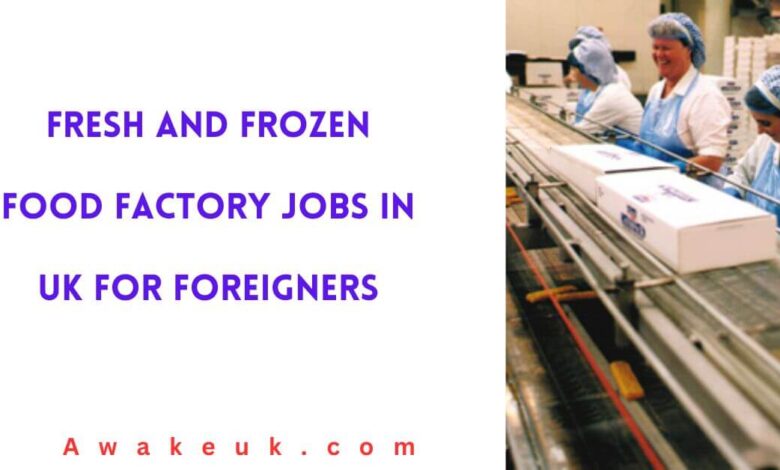Fresh and Frozen Food Factory Jobs in UK for Foreigners 2024

The UK government made it easier for people from other countries to get work visas and student visas for studying in the UK. Private companies still have to go through a formal process that takes a long time with the Ministry of Labor. Someone from outside of the UK who gets a job in the government or a state factory is truly blessed. This post has brought up a great job chance to work in a factory in the UK: Frozen Food Factory Jobs in the UK for Foreigners.
The company is called Quay Fresh& Frozen Foods Limited. This plant makes both fresh and frozen foods, as the name suggests. The business wants to hire honest, hardworking and energized people to work with them. The company wants you to send them a short introduction and your current CV. Please note that this job is open full-time or part-time.
Details of Fresh and Frozen Food Factory Jobs in UK for Foreigners:
- Job title: Fresh & Frozen Food Factory Worker
- Job Region: New Quay, Wales, UK
- Employer’s name: Quay Fresh and Frozen Food Limited
- Expected Salary: Depends upon the job position. However, starts from £10.50 per hour
- Minimum knowledge required: GCSEs
- Minimum experience required: No
- Expected Salary: £ 10.00 to £ 15 per hour
- Eligibility: All foreign nationalities
Introduction:
The fresh and frozen food business in the UK is an important part of the country’s economy and makes a big contribution to the GDP. As the need for high-quality foods grows, food factories are very important for making sure there is a steady supply to meet buyer needs.
Opportunities for Foreigners
As the industry grows, it welcomes people from all over the world, creating many job chances for people from other countries. Because the UK wants to be more open and accepting, skilled workers are becoming more interested in working in food plants.
Benefits of Fresh and Frozen Food Factory Jobs:
- Job Stability: Food is a vital commodity, and employment in factories producing fresh and preserved foods is consistently in demand. This can ensure employment security and stability, even in periods of economic recession.
- Entry-Level Opportunities: A considerable number of positions within food factories do not necessitate prior experience or particular qualifications, rendering them accessible to individuals transitioning between occupations or seeking entry-level employment.
- Variety of Roles: A wide array of responsibilities and proficiencies are necessary in food factories, which provide employment prospects in management, packaging, quality control, maintenance, production, and logistics. This diversity enables individuals to investigate various career paths and roles within the industry.
- Training and Skill Development: Food manufacturing facilities frequently offer skill development and on-the-job training initiatives to furnish staff members with the requisite knowledge and expertise associated with their respective positions. This training has the potential to augment employability and facilitate career progression.
- Competitive Wages and Benefits: In addition to competitive wages and benefits, numerous food factories provide their employees with health insurance, retirement programs, paid leave, and food product discounts.
- Safe Working Environment: Food manufacturers place a high value on employee safety and strictly adhere to regulations to provide a secure working environment. This encompasses the provision of personal protective apparatus, the implementation of safety protocols, and the conduct of routine safety training.
- Collaboration and Teamwork: Employees of a food factory frequently engage in teamwork and collaboration to ensure food safety, meet production goals, and uphold quality standards.
- Prospects for Progression: Staff members who exhibit dependability, commitment, and a robust professional code may be eligible for advancement opportunities within the organization. This may encompass advancements to managerial or supervisory positions, as well as specialized jobs in domains like production planning or quality assurance.
- Contribution to Food Supply: Employment in a fresh and frozen food factory affords individuals the opportunity to aid in the manufacturing process of consumer-essential food products that are secure, nutritious, and convenient. For personnel, this sense of purpose can be gratifying.
- Sector Development and Innovation: The food industry is in a constant state of change, as technological, procedural, and product developments occur. Opportunities abound for individuals to participate in this innovation and offer input into the formulation of novel food products and production techniques through employment in a food factory.
Requirements:
- You need to have at least a GCSE with marks 9–3 (A*–D) or something similar.
- Experience is not required, but it is very helpful. In particular, people who work in cold storage, chillers, or other Fresh Food Factories.
- You don’t have to take the IELTS, but you do need to be good at English.
- During your interview, you will have to pass a test to see how well you can do the job.
- To work with your hands, you need to be good at doing things by hand.
- It’s important that you can work in a fast-paced setting.
- Your hands and eyes need to work well together.
- You need to be able to stand for long amounts of time.
- Must know the basics of how to make food and how machines work.
- You need to know a lot about creation and how things are made.
- You need to be able to work under pressure.
- You need to have a formal permit to work or live in the country.
Additional Benefits of Fresh & Frozen Food Factory Jobs:
- Paid Annual Leave.
- Paid Holidays.
- Paid Sick or Maternity Leave.
- Good Salary Package.
- The company is offering both part-time and full-time job opportunities.
- Promotion potential.
- More Job opportunities with experience acquired.
- Decent pay rate.
Job Duties of a Worker in Fresh & Frozen Food Factories
- Making sure that fresh and frozen foods are made, packed, and sent to stores safely. Maintaining and running cold storage or chillers in a safe setting is very important for frozen foods.
- Using manual or automatic tools for production, packing, and labeling.
- Health, safety, and food handling requirements must be followed exactly as they are written.
- As the government says, following the Food Safety Regulations.
- Tell the Line Manager about all of the problems.
- Keep track of your work records, such as computer data and written materials.
Average Salary:
A Fresh & Frozen Food Factory Worker or Food Factory Worker’s average salary mostly relies on how much experience they have and what kind of work schedule they have, such as whether they work shifts or set hours, full-time, part-time, or overtime, and so on. However, Indeed’s poll shows that the average Food Factory Worker or Production Line Worker makes £10 to £15. That means Quay Foods pays you pretty well.
How to Apply for Fresh & Frozen Food Factory Worker Jobs in UK for Foreigners?
- Please click on the link given below.
- Start by making an account. If you already have an account, sign in.
- When you sign up for an account, you’ll get a confirmation email.
- If you can’t find the email in your inbox, look in the junk or trash folders.
- After making sure the email is real, you can click on the job you want to apply for.
- Send in your CV and the other details asked for.
Conclusion:
In conclusion, the fresh and frozen food business in the UK has a lot of job openings for people from other countries. This industry is good for people with a wide range of skills and goals because it offers a range of jobs with good pay and a friendly workplace. As you start this exciting journey, don’t forget to enjoy the challenges, be proud of your accomplishments, and help this field grow.
Frequently Asked Questions:
-
What is the difference between fresh and frozen?
Frozen produce may have more nutrients than fresh produce, as it is typically picked at peak ripeness. However, processing results in the loss of some nutrients, and prolonged storage leads to the degradation of both nutrients. Fresh fruits and vegetables are some of the healthiest foods you can eat.
-
Is frozen produce cheaper than fresh?
Frozen vegetables are typically less expensive than their fresh alternatives. In addition to reducing costs, frozen vegetables can also contain more servings than the fresh option. This enables you to get more for your money.
-
Why is fresh food better than frozen?
Nutrients. Studies have shown that freezing reduces the nutrient value of a meal. Frozen meals also generally provide small quantities of vegetables and fruits. Because vegetables and fruits provide many of the vitamins and minerals that are essential to our health, we want to guarantee that we consume enough of them.



